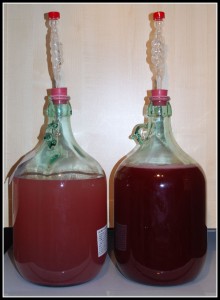Home brewing = Major carbon reduction?
I'm really struggling at the moment to stick to my own pledge not to drink anything alcoholic unless I've brewed it myself. After a long hard day on the plot, coming home aching all over and slightly dehydrated, nothing would be better than a cool bottle of cider or nice glass of red. It took all the determination I could summon this evening to dissuade myself from stopping off at the corner shop on the way home.
In the end, I persuaded myself that buying alcohol was a waste of money, likely to mean my turning up late at the plot tomorrow with a hangover - and also maybe a bit less green than brewing my own.
The more I thought about the latter point, the more I realised how bad the carbon burden of the average alcoholic beverage must be. At best, cans of lager are produced from steel or aluminium, then their not insubstantial weight shipped around to the shops by lorry. Worse must be wine and bottled beer. Even recycled glass needs massive furnaces to produce and, once bottled, the product invariably gets shipped huge distances to market. It's like imported food, but with far worse packaging.
Contrast this with (proper) home brew. Once you've got demijohns or brewing barrels, the ingredients can be had for free either from home growing, or scavenged from a local hedgerow - and the packaging can be reused ad infinitum. The only bit which is less then shiny green are the bottle caps or corks. And you can even reuse plastic corks to a certain degree.
All in all, alcohol has to be one of the worst offenders within the food and drink industry when it comes to carbon burden yet little, if anything, seems to get said about it. You can bet though, given the tax revenue generated, that no-one within government's going to start encouraging or promoting home brewing any time soon.
 April 3, 2010
В·
April 3, 2010
В·  admin В·
admin В·  No Comments
No Comments
 Tags: cider, wine В· Posted in: Home Brewing
Tags: cider, wine В· Posted in: Home Brewing



Leave a Reply